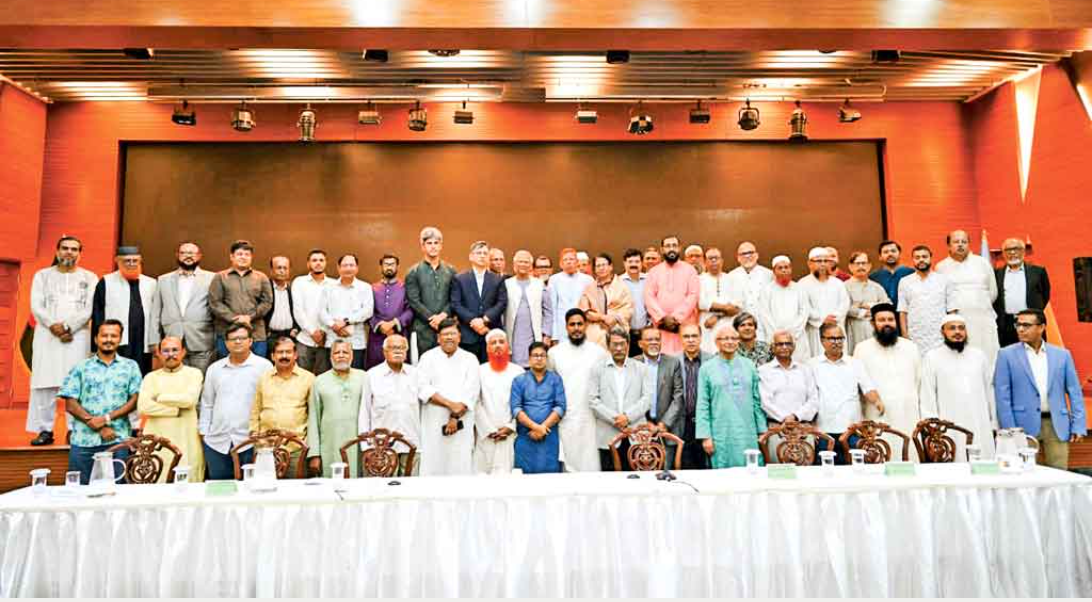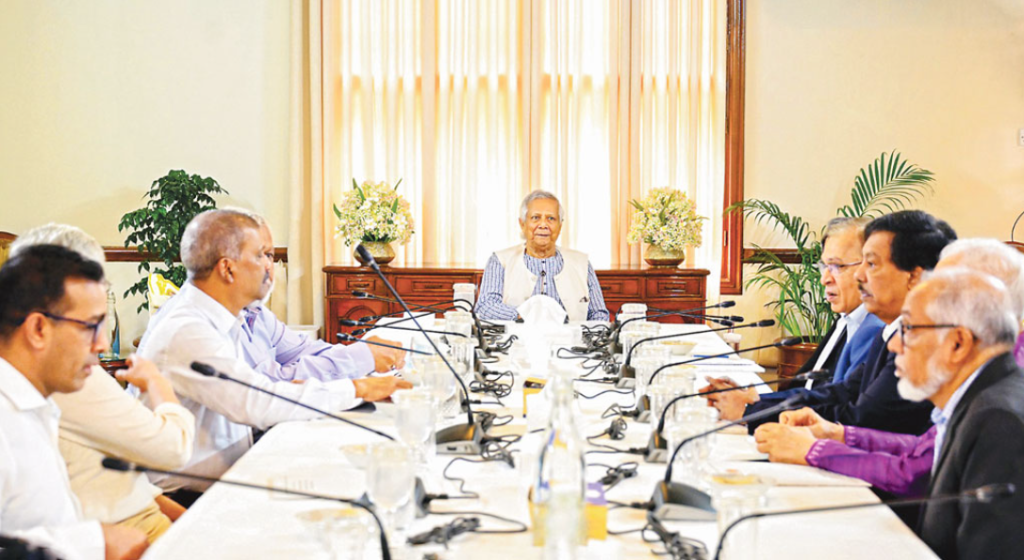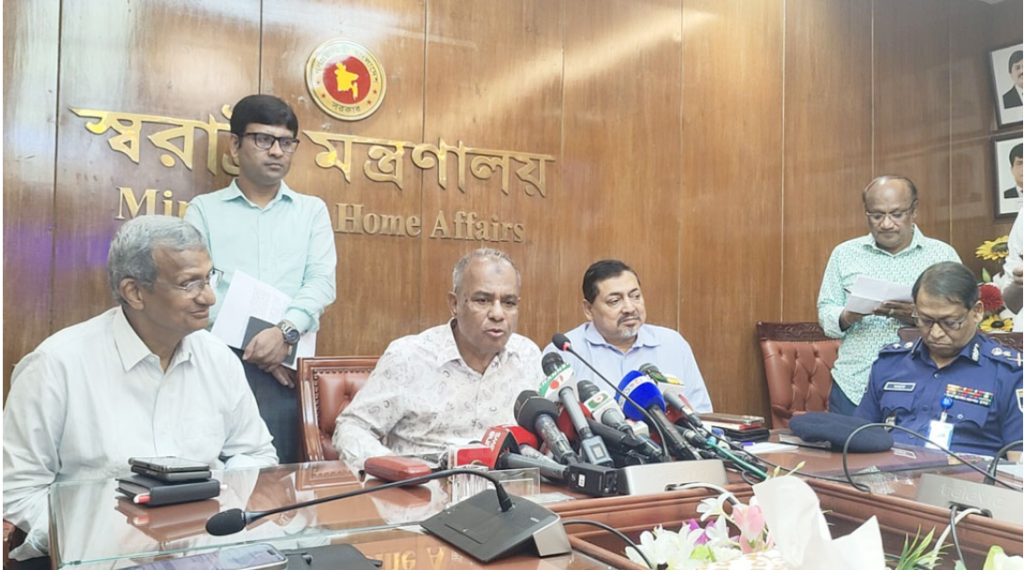Desk Report:
The National Consensus Commission hopes that the political parties will agree to implement the July Charter by forgetting their differences. For this, the commission will continue the discussions. However, if the parties cannot reach an agreement in the end, the government will decide the implementation method.
On the second day of discussions on the implementation method of the charter, yesterday, Sunday, the parties including Jamaat-e-Islami and the National Citizens Party (NCP) remained steadfast in their respective positions. BNP also stated that it would remain steadfast in its position. However, the party advised the government to decide the implementation method.
The National Consensus Commission held a dialogue with the political parties at the Foreign Service Academy in the capital yesterday to create a political consensus on the implementation of the July Charter. At the beginning of the day, the President and Chief Advisor of the National Consensus Commission, Dr. Muhammad Yunus, addressed the parties.
In his speech, the Chief Advisor said, “There is no way out of here. There is no chance of getting out of the path of compromise that we have started.” This compromise must be reached.’
Sources said that the government has been emphasizing political consensus so far to implement the July Charter. For this, the commission has been asked to continue further discussions with the parties. Although the term of the commission was supposed to end today, Monday, it will be extended by one month until October 15. The commission will meet again with the parties next Wednesday to discuss the means of implementation. In this case, if the parties do not agree, the government will decide the implementation method.
Under the chairmanship of the vice-chairman of the commission, Professor Ali Riaz, and the moderator of the special assistant to the chief advisor (National Consensus Commission), Monir Haider, legal advisor Asif Nazrul, BNP standing committee member Salahuddin Ahmed, Jamaat assistant secretary general Hamidur Rahman Azad, and NCP member secretary Akhtar Hossain spoke at the dialogue yesterday.
Addressing the chief advisor, Salahuddin Ahmed said, ‘Find a process that is definitely implementable. You have taken the opinions of experts. If you think it is appropriate to implement what they have said in this manner, you have the freedom. We will have no say. If you think it is appropriate to take a judicial opinion, you can do that. Even then, find a solution to it. Let the uncertainty be removed.’
Describing the July Charter as a ‘historical and nationally important document’, the BNP leader said, ‘It must be implemented in such a way that it is not questioned in any court in the future.’
Regarding the elections, BNP’s Salahuddin Ahmed said, ‘It is not conditional in any way. Reforms will continue, the judicial process will continue, but the elections must be held on time.’ He believes that if uncertainty is created in the elections, it can pose a threat not only to national security but also to regional security.
Jamaat’s Hamidur Rahman Azad said, ‘There has already been consensus on 84 issues of the July Charter. Now it is no longer a matter of discussion, the question is only of implementation. It must be signed as a state document and receive legal recognition. If a constitutional order is issued instead of a constitutional amendment, it will be much stronger and cannot be challenged.’
The Jamaat leader also said, ‘In the history of Bangladesh, many laws and constitutional amendments have been annulled in the courts. Therefore, we want the July Charter to have a legal basis that will be sustainable. If necessary, it can be further strengthened through a referendum later.’
NCP’s Akhtar Hossain said that in order to sustainably implement the constitutional issues of the July Charter, a legal basis must be ensured. Out of the 84 points of the charter, 43 points are directly related to the constitution. Therefore, these cannot be limited to promises; rather, they must be implemented by forming a Constituent Assembly to make them effective and permanent.
Seeking political unity and support, National Consensus Commission Vice-Chairman Professor Ali Riaz said, ‘The July Charter has been formulated with the joint efforts of political leaders and the commission. This charter is the result of defeating a fascist regime. We have to move forward to take this process forward. The responsibility of making this process successful lies with our martyrs.’
For the implementation of the July Charter, experts had proposed that constitutional matters, other than ordinances and executive orders, be implemented through a referendum, a special constitutional order, or the opinion of the Supreme Court under Article 106 of the Constitution. But in last week’s meeting, the commission moved away from that position and proposed implementation through a special constitution or constitutional reform order. In its meeting with political parties last Thursday, the commission said that they would meet with the experts again. Then yesterday morning, the National Consensus Commission met with experts at the Foreign Service Academy. There, it advised the interim government to implement the July Charter by issuing Constitutional Order-2025. If that is done, they said that the people’s consent on this matter should be obtained through a referendum on the day of the national election.
The experts who participated in the discussion last night included retired Supreme Court Appellate Division Justice MA Matin, Dean of the Faculty of Law of Dhaka University Mohammad Ikramul Haque, Senior Advocate of the Supreme Court of Bangladesh Dr. Sharif Bhuiyan, Barrister Tanim Hossain Shawon and Barrister Imran Siddique.
Experts had feared a negative outcome in the referendum due to the conflicting positions of the political parties. Now, when asked why he gave the advice, one of the experts said, various surveys show that the people of the country are in favor of reforms. In that case, if a referendum is held on the July Charter on the election day, no political party will spread negative propaganda on the issue. Motivate workers and supporters to vote against the July Charter
No. In that case, the July Charter will be passed in a referendum. This suggestion has been made with all these things in mind.




